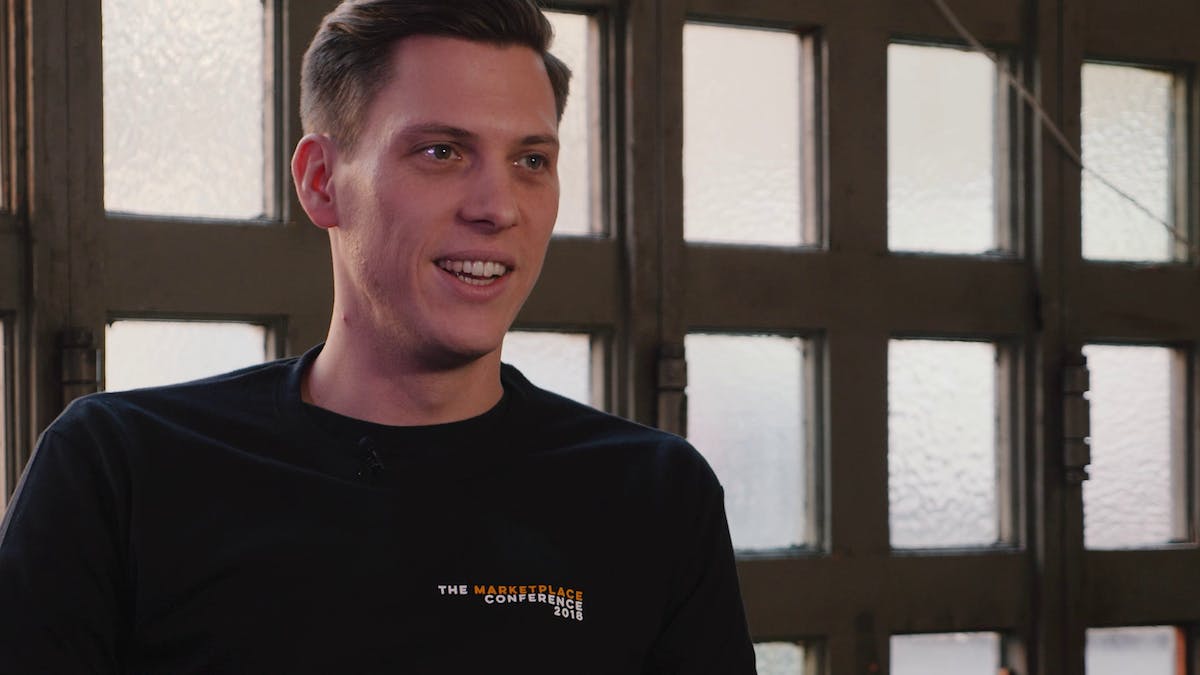Investor Josh Breinlinger on why investors love B2B marketplaces
Thinking of building a B2B marketplace? Watch Josh Breinlinger’s interview for some tactical advice.
Published on
Last updated on

Welcome to episode 8 of The Backstage. In this video interview series, we bring you backstage chats with leading marketplace experts.
B2B marketplaces are currently on every marketplace investor’s radar. Josh Breinlinger, General Partner at Jackson Square Ventures, says there are tremendous opportunities for marketplaces that are able to identify and solve the productivity gaps in high-volume B2B transactions.
Business-to-business markets are massive. For instance, in 2019, the size of the global B2B eCommerce market was valued at US $12.2 trillion. That is over six times the size of the eCommerce market in B2C.
Yet, many B2B industries have so far avoided the marketplace revolution that has made business-to-consumer markets a lot more efficient and convenient for both providers and customers. In fact, a large part of high-value, high-frequency transactions in B2B still takes place through painstakingly manual processes.
Josh Breinlinger sees this as a tremendous opportunity.
Breinlinger has spent nearly two decades building, running, and investing in marketplace businesses, and is currently a General Partner at the $430-million VC firm Jackson Square Ventures. In this interview, he discusses how marketplace entrepreneurs can find and leverage the untapped opportunities in B2B.
Pressed for time? Here are our three main takeaways.
- Follow the inefficiencies. B2B transactions can have several steps that are cumbersome and manual: finding suppliers through directories, writing formal RfQs and offers, securing the necessary licenses and certifications, compiling contracts, and so on. Each clunky step in the process represents an opportunity for your marketplace to offer a better experience.
- Don’t be fooled by the fax machine. In the search for inefficiencies, it’s easy to jump to conclusions at the first sight of manual work or antiquated technologies. Breinlinger warns against making such leaps. Instead, he encourages aspiring B2B marketplace entrepreneurs to spend time getting a deep understanding of the industry and its processes. After looking over someone’s shoulder for a week, you’re much better equipped to identify the biggest pain points and come up with ways to improve them.
- Take on a failed incumbent. The competition on a B2B market isn’t over when the first marketplace business enters it. Far from it. Breinlinger notes that B2B marketplaces too can stag
More of a reader? You can read a full transcript of our interview with Josh Breinlinger below. The transcript is lightly edited for an enjoyable reading experience.
My name is Josh Breinlinger. I'm a general partner at Jackson Square Ventures.
We're a $430-million VC firm based in San Francisco ($240 million at the time of this recording; Jackson Square Ventures announced a new fund of $193 million in October 2019). We do early-stage SaaS and marketplace businesses. A lot of the companies people will know are things like DocuSign, which went public, or Upwork that went public recently.
We're an anti-hype firm. What that means is we try to be both non-consensus and right, and the way we do it is we actually avoid hype. If you've seen Gartner's Hype Cycle, we avoid the peak hype and try to invest at the low points of hype.
My focus is exclusively on marketplaces. I was a marketplace operator for about seven years as a founding team member at oDesk, which became Upwork, and a founding team member at Rev. And for the last seven years, I've been investing in marketplaces.
I do love B2B marketplaces. I think there's tremendous opportunity there.
The B2B marketplaces tend to have both high frequency of purchase and high-priced transactions. That's very rare to find in other marketplaces.
And there's massive inefficiency in these markets. There's just massive markets period. It's kind of like we've seen with the consumerization of IT over the years—that was the buzzword something like five years ago—where consumer software and email got really, really good, but enterprise software lagged and came along later.
I think the same is basically happening with marketplaces.
The consumer marketplaces are really, really good, and convenient, and fully managed, and great experiences. In B2B, we're starting to see that now as they're getting into that level of convenience, and simplicity, and great experience. So I think there's a ton of opportunities in B2B.
I actually think of some of the B2B marketplaces as really more like procurement platforms. Sure, it's kind of a marketplace, but I think the way people use it is instead of going through this antiquated procurement process.
I literally used to work at a company where I would have to go find a whole bunch of vendors on Google, call them up and get RfQs, call them up and get their ISO 9000 certifications. And then take a form over to the purchasing department in triplicate, and then they would actually purchase it for me.
And so it's clearly just an inefficient, antiquated process. And I think that's the opportunity: when there's massive amounts of commerce happening in a very, very inefficient way. That's where a good B2B marketplace can come along and streamline all of that activity.
In general, we're a fairly opportunistic fund. We're not necessarily a thesis-driven fund where we say, "Hey, oil and gas is great." And we think entrepreneurs are generally smarter than we are, so we'll leave it to the entrepreneurs to figure out which areas to go after.
That said, I think the oil and gas industry is a great example. We actually haven’t made an investment here yet, but I think there's really interesting things happening with a company like RigUp.
RigUp makes it easy for any oil and gas company to buy services from hundreds of different vendors. They're sort of vertical for the oil and gas industry, and then horizontal across every single type of service that you could possibly imagine. Their real value is that it's just incredibly easy. Everybody's certified, on the right contract terms, on the right payment terms. So, for these oil and gas companies, it actually accelerates their speed and increases their efficiency.
Deep industry expertise certainly helps, but I also think it's something you can get relatively quickly.
I think there's two...well, there's one mistake I see people make, which is that they see some paper fax thing and make the leap to, "Oh, man, this industry is stupid and antiquated". It's important to go in with an open mind and try to really understand why things are happening the way they're happening.
I would just encourage entrepreneurs to go sit with the people that are actually making these decisions. Go plant yourself in an office, and try to look over someone's shoulder for a week, and really understand at a deep level how they're making various purchasing decisions. And I think if you can approach like that, and understand where the time is spent. Maybe even document exactly how much time is spent on which task, and figure out which ones can you automate first.
You're not going to be able to do it all at once. But if you can just automate one step at a time—probably start with the biggest pain point, or the thing that people just hate doing—that's a great way to get the initial acquisition. And then just continue to improve the efficiency from there.
The most recent announced deal is a company called CREXi, which is a commercial real estate marketplace based in LA. I love the team, I love the space. Commercial real estate is a trillion-dollar industry that has a lot of these characteristics: it's wildly inefficient, there's brokers shuffling paper back and forth...
To me, this is a great example of where the incumbent has failed. And the incumbent is another marketplace: it's LoopNet, and CoStar which is a roughly $9 billion public company. But they have stagnated, and they have not reinforced their network effects, and that left an opportunity for CREXi to come in.
That's part of why I think, you know, you should never assume that the market is over. If a company is stagnating and not improving the experience, there's always an opportunity.
So they've come along, and they've reached similar volumes to LoopNet in a very short time period. And they have mostly "for sale" listings. These are average of $5 million each. They've just recently added "for lease" listings, and they're rapidly catching up to the incumbent. And really it's just because they provide a way better user experience than the incumbent, and so all the industry is flocking to the platform.
This is the eighth episode in The Backstage interview series. The series has 13 episodes featuring marketplace industry heavyweights like Doreen Huber, Ben Narasin, and Carmen Alfonso Rico. You can subscribe to the series by signing up for the Marketplace Academy newsletter.
You might also like...

What do investors look for in marketplaces?
Mathias Ockenfels shares his love of network effects – and how he spots them early on.

How to build your marketplace supply
How to bring in the first, quality providers before your platform has any customers.

How to find great online marketplace ideas
How to spot marketplace opportunities and transform them into great business ideas.
Start your 14-day free trial
Create a marketplace today!
- Launch quickly, without coding
- Extend infinitely
- Scale to any size
No credit card required
